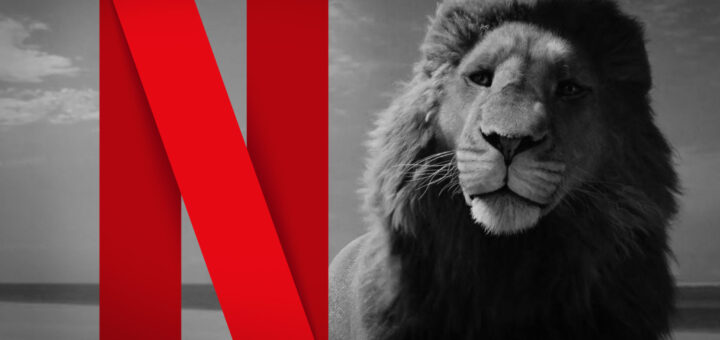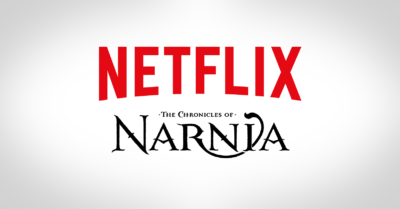Netflix Exec: Narnia Books “Are Very Much Based in Christianity”

In a recent interview, Netflix’s Film Chief Scott Stuber delved into the decision to entrust filmmaker Greta Gerwig with adapting C.S. Lewis’ beloved Chronicles of Narnia books. When asked what made Gerwig a good fit, he replied:
Greta’s been a friend for a while…If you don’t know her, she’s truly one of the greatest people, not an artist, but a human being. She’s just got this great soul…
She grew up in a Christian background. The C.S. Lewis books are very much based in Christianity. And so we just started talking about it. And like I said earlier, we don’t have IP, so when we had the opportunity [to license] those books… we’ve jumped at it, to have stories that people recognize and the ability to tell those stories. So it was just a great opportunity and I’m so thrilled that she’s working on it with us and I’m just thrilled to be in business with her. And she’s just an incredible talent.
Scott Stuber
Gerwig recently shared that the Narnia series has meant a lot to her throughout her life and how “terrified” she is adapting them.
Related: What Narnia Fans Should Know About Greta Gerwig
How are you feeling overall about Netflix and Gerwig adapting Narnia? Have the recent interviews changed your thoughts at all? Post a comment below!






My mind hasn’t changed. She’s a bad choice.
Greta Gerwig is an great choice for Narnia. I love her work, but adapting such a beloved series is no small task. I hope she stays true to the spirit of the books while bringing her own creative flair. Excited but cautious!
Feeling very encouraged! Every bit of news has been positive, in my opinion.
Greta Gerwig adapting Narnia? Yes, please! Her passion for the series and the fact that she’s “terrified” just shows how much she cares about doing justice to the source material. This is the kind of dedication we need for a Narnia adaptation.
Glad to see that Netflix knows this is important as well!
@BobKemp, I suppose saying this is begging you to start a flame war, but could you give a specific reason why you think she’s a bad choice? I don’t think she’s a good choice either, so I’ve given specific reasons why in other Narniaweb discussions. Even if your reasons have to do with religion or politics, you don’t have to say them in a way that will make people mad. For example, you could say, “Her views are not compatible with the philosophy of the Narnia books” and then you could share a quote from her or from one of her movies and contrast it with a quote from the books, demonstrating she’d have a hard time adapting that. Or if you’ve found her movies to be bad, you could list specific things from them that were bad, such as the acting or the dialogue or the music. Maybe there’s no way for you to do those things without angering Gerwig’s passionate fandom but I’d like to see someone try.
@Col Klink, does Greta have a passionate fandom on Narniaweb? I agree with Bob Kemp on this and I do have an example with how she did Little Women. She put modern thinking along with loud attitudes in the movie. She lost the innocence from the book and really left God out as well. So yes this is very doubtful she will respect the Narnia stories and keeping them with the Christian tone.
I think it’s positive to see that Netflix finds it valuable to have someone at the helm who’s enjoys the books and is familar with their Christian undertones. Walden/Disney/Fox executives continually tried to shy away from that – so it’s very interesting to hear Scott talk about this so openly without even a prompt.
Definitely something of note. Excited to see what comes next from Gerwig and Netflix!
@Betsy, I don’t know if Greta Gerwig has a passionate fandom on Narniaweb specifically, but she does have one out in the world of film aficionados, many of whom won’t be fans of Narnia but will click on this article anyway because it has her name in the title.
BTW, are you a fan of the 1994 movie adaptation of Little Women? Because I’d say that one adds just as much modern commentary to the story as the 2019 movie does and it does so in a much clunkier fashion. It also uses less dialogue from the book, does less justice to many, though not all, of the characters, and does less justice to the book’s message of self-control. Yet it seems like fewer people complain about the 1994 movie being too feminist and revisionist than they do the 2019 one. I don’t understand it. Well, I can kind of understand it because I think the 1994 movie has better casting, music, costumes, etc. But I still say the 2019 Little Women has the superior script. The parts with modern social messages are confined to a handful of scenes and the book’s timeless messages are still present.
@Betsy is God a character in Little Women? (Obviously God is a character in Narnia.)
Growing up and a loss of innocence is to some degree a theme of the novel. I don’t know what “loud attitudes” you might be referring to in Gerwig’s Little Women adaptation, but all the “modern thinking” present was 100% faithful to Alcott and her original intentions writing the book before her publishers forced her to write a happy romantic ending.
@Yavar, actually, Alcott probably wouldn’t have written Little Women at all if it weren’t for her publishers. She preferred writing about boys but an editor asked for a story about girls, and she needed the money. Thus, was history made. LOL.
FWIW, I can’t say that all the “modern thinking” in the 2019 Little Women is 100% faithful to Alcott. In the book, the character of Marmee praises her husband for doing his duty to “the country he loves.” In the movie, she says she’s ashamed of her country. That’s a pretty minor point though and I believe that pro-American viewers can still enjoy the movie and anti-American readers can still enjoy the book. (They’re both mostly about other things.) 🙂
I’m cautiously optimistic about this. Greta Gerwig is undeniably talented, but adapting C.S. Lewis’ Narnia books is a huge responsibility. Hope she stays true to the source material and delivers a faithful and wondrous experience!
I just think it’s fantastic to see a Netflix executive saying out loud that the Narnia books are “very much based in Christianity” and they obviously see it as important that their chosen director “grew up in a Christian background”. That’s not a guarantee that the Netflix productions will respect the source material, or that they’ll satisfy the majority of established fans of the books, but it’s a big step in the right direction, that they’re happy to acknowledge the “based in Christianity” aspect at all. Plenty of mainstream producers and directors would shy away from even mentioning that.
My view is with Bob Kemp and Betsy. The fundamental problem, other possible issues not withstanding, is this: GRETA IS A FEMINIST. This means that she will naturally twist old stories to fit with that world view. The Little Women example from Betsy is typical, as well as Barbie, which some called a modern feminist propaganda piece. Narnia is not only Christian in world view, it is also most certainly not feminist. I can already imagine the kind of things she might do with the books, and I’m really not liking them.
I take from this that Netflix might be considering marketing this franchise to the Christian market, which has made many a box office success of late, including Jesus Revolution and I Can Only Imagine.
Disney marketed to that subculture too, but things have changed a bit since then.
Gerwig remains a controversial choice to me too. The way she has described her Christian beliefs and her church sounded to me like universalism. Combine that with the very unsubtle and distasteful messages in her Barbie movie, and I find it hard to believe she can pull off an adaptation that’s true to what C.S. Lewis wrote and stood for.
I think this comment from Stuber is an attempt to win over more conservative Christians, and it’s just lip service until we can actually see what they have planned. I think a lot of us are quite a bit more suspicious of the industry than we were in the early 2000’s, and though I hope I’ll be pleasantly surprised in the end, they’ve got a lot to prove before they win my confidence.
I agree with both Jonathan Paravel and Skilletdude that it sounds like Netflix wants to cater to conservatives / Christians. However, I don’t think that that’s necessarily problematic. If it’s indeed a series, and they want this target group to be happy, they might indeed not just pay lip service, but actually deliver.
Especially as they realize that this target group is not always happy with many current main stream productions, and as smaller studios emerge (Angel Studios, the Daily Wire stuff). If Netflix wants to keep catering to a broad audience, they need to cater for all of them.
Regarding concerns about universalism (even though I don’t support this view), I don’t think that has to be a problem for Narnia. One of C. S. Lewis’ greatest role models (George Macdonald) had also been criticised for his universalist tendencies. Even though Lewis didn’t agree with universalism, he was not as extremely against it as others (consider Emeth in LB).
It’s nice to hear that Netflix recognizes that Narnia has Christian elements, even though there are non-Christians who enjoy them!
Even though I would not expect anything religious, they should at least make it so that even non-Christian audiences can enjoy without turning into a sermon.
Emeth is my favorite character and his meeting with Aslan is one of my favorite scenes. If Netflix could get to LB and include that scene, they could even possibly expand on Emeth’s character, perhaps even make him conflicted and sympathetic.
I’m really tired of some people acting like “Christian” and “conservative” just go together. There may be overlap but I see nothing here that indicates Netflix is catering to conservatives. And thank goodness! So much in our culture is already politicized to heck, and if Narnia ends up being “Netflix’s fantasy series for conservatives” I think that would be a GREAT disservice to the books and C.S. Lewis. I don’t think Lewis bears much in common with current day conservatives, and for that matter I don’t think any of the Narnia books really clash with the concept of feminism.
In fact I’d say that (particularly for his day) Lewis was something of a feminist himself! For his very first book in the series he made sure to have a perfectly equal number of male/female protagonists with the four Pevensie siblings — that’s a pretty feminist ratio (real feminism is actually about equality of opportunity between the sexes, NOT elevating women *above* men!) I think people overlook that Lewis easily could have focused on primarily male protagonists throughout all his Narnia books, but he was always careful to have strong female characters present as well, and about the same quantity of them! (Following the Pevensie books there was Eustace/Jill, Shasta/Aravis, and Digory/Polly.) Contrast him with his friend J.R.R. Tolkien and the difference is STARK to put it mildly: yes, Galadriel and Eowyn are powerful female characters, but all *nine* members of the main Fellowship are male… I suspect if Lewis had somehow written Lord of the Rings he actually would have made half of them female! And in the realm of children’s fantasy, The Hobbit is virtually if not totally devoid of female characters even in supporting roles! All thirteen dwarves are male, in addition to Gandalf and Bilbo and Gollum and Bard and Smaug and the Elven king and…
Lewis has his male characters grow and learn things from his female characters, and his female characters grow and learn things from his male characters. And to me that shows the essence of feminism. The notion that he was somehow *anti*feminist just because he ideally didn’t want girls involved in a battle is just bizarre to me. (And the girls in LWW still got weapons! Susan led the archers! He didn’t have them toiling in the kitchen to prepare food for the male warriors, for goodness’ sake!)
One could also compare this with the MCU, with conservatives all in a tizzy against The Marvels because three of the four central protagonists are female. I can’t roll my eyes back in my head far enough at this attitude. C.S. Lewis was considerably more feminist and “woke” (in the actual dictionary meaning of the term) than the MCU or any modern film studio. Even being written and directed by “girl power” Buffy the Vampire Slayer’s Joss Whedon, the original Avengers film had *one* (non-super-powered!) token female member of the team. The MCU made TWENTY FILMS over more than a decade before they finally got around to producing their first centered around a female lead (and that film was unfortunately terribly mediocre, IMO). If someone complaining about “feminism” and “wokeness” in Hollywood today thinks that C.S. Lewis would be on their side if alive today, they are very, very much mistaken.
He would in fact be much more aligned with Greta Gerwig, in my view. I have a lot of issues with the superficial Feminism 101 of Barbie (though it is appropriate for the brand, I suppose). But everyone agrees that Ken is the best part of that movie, and that’s a combination of Ryan Gosling’s give-it-his-all performance as well as Gerwig writing an interesting arc for his character. He really does have legit grievances and it’s clear Gerwig doesn’t think that a society in which men are dominated by women is the answer either, even as she critiques our own patriarchal world.
Anyhow, amid the chorus I keep see showing up on the comment sections to hate on Gerwig because she’s a feminist, I just had to get that off my chest. I was raised Roman Catholic by my mother with some help from my grandmother — two women who are staunch liberal feminists, and also among the most religious Christians I know (much more religious than my father or grandfather). Christianity is not inherently opposed to feminism or liberalism, no matter how much that might annoy conservatives to hear, who often display an apparent need to have their club be exclusionary.
Even though I wouldn’t expect anything religious, it’s really an appreciation that Netflix recognizes that Narnia has Christian elements.
For MN, there’s the creation of Narnia, and I haven’t really watched very many creation movies or shows. The same with LB, since I haven’t really watched that many apocalyptic end time movies or shows other than The Omega Code and Left Behind (though LB are not necessarily like those).
Anyways, while Narnia isn’t necessarily the fantasy version of the Bible, there is Christian aspects in it. It should also be important for audiences to know who Aslan is in our world, even if they didn’t come from a religious background.
@Yavar Moradi, I hate to depress you but here is what C. S. Lewis wrote about gender roles.
“So much for the Christian doctrine about the permanence of marriage. Something else, even more unpopular, remains to be dealt with. Christian wives promise to obey their husbands. In Christian marriage the man is said to be the “head.” Two questions obviously arise here, (1) Why should there be a head at all — why not equality? (2) Why should it be the man?
(1) The need for some head follows from the idea that marriage is permanent Of course, as long as the husband and wife are agreed, no question of a head need arise; and we may hope that this will be the normal state of affairs in a Christian marriage. But when there is a real disagreement, what is to happen? Talk it over, of course; but I am assuming they have done that and still failed to reach agreement What do they do next? They cannot decide
by a majority vote, for in a council of two there can be no majority. Surely, only one or other of two things can happen: either they must separate and go their own ways or else one or other of them must have a casting vote. If marriage is permanent, one or other party must, in the last resort, have the power of deciding the family policy. You cannot have a permanent association without a constitution.
(2) If there must be a head, why the man? Well, firstly, is there any very serious wish that it should be the woman? As I have said, I am not married myself, but as far as 1 can see, even a woman who wants to be the head of her own house does not usually admire the same state of things when she finds it going
on next door. She is much more likely to say “Poor Mr. X! Why he allows that appalling woman to boss him about the way she does is more than I can imagine.” I do not think she is even very nattered if anyone mentions the fact of her own “headship.” There must be something unnatural about the rule of wives over husbands, because the wives themselves are half ashamed of it and despise the husbands whom they rule. But there is also another reason; and here Ispeak quite frankly as a bachelor, because it is a reason you can see from outside
even better than from inside. The relations of the family to the outer world — what might be called its foreign policy — must depend, in the last resort, upon the man, because he always ought to be, and usually is, much more just to the outsiders. A woman is primarily fighting for her own children and husband against the rest of the world. Naturally, almost, in a sense, rightly, their claims override, for her, all other claims. She is the special trustee of their interests. The function of the husband is to see that this natural preference of hers is not given its head. He has the last word in order to protect other people from the intense
family patriotism of the wife. If anyone doubts this, let me ask a simple question. If your dog has bitten the child next door, or if your child has hurt the dog next door, which would you sooner have to deal with, the master of that house or the mistress? Or, if you are a married woman, let me ask you this question. Much as you admire your husband, would you not say that his chief failing is his tendency not to stick up for his rights and yours against the neighbours as vigorously as you would like? A bit of an Appeaser? ”
I agree with you though that there are no reasons that people with diverse philosophies about gender can’t enjoy the Narnia books or diverse opinions about other things actually.
@Yavar Moradi, I don’t think we should conclude that someone is a feminist just because he made sure that the male/female ratio in his book is even, while someone who writes about men cannot be a feminst and must be this horrible, pesky conservatist.
I consider myself a feminist and a conservative leaning centrist and I’m a fiction writer myself. I like writing about women and men equally and I think literature and cinema need more complex and iconic female characters. Still, the gender of my characters always depends on the story and theme. If I wrote about medieval battles and perilous journeys, I wouldn’t make half of the characters female, sorry. I’d probably put more female characters in my book than Tolkien did but the realistic thing to do in his world was just to send men on this journey, instead of making sure that there is at least 50% women for the sake of representation.
Just because someone writes about little girls shooting arrows, doesn’t automatically mean he’s a feminist, as Col Klink just demonstrated. Feminism is much more and, I would even say, something much different from ensuring that 50% characters in your fiction are women.